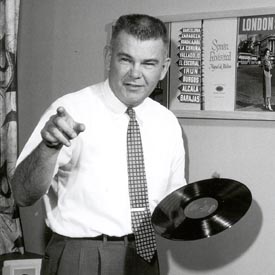Capitol Records & The Beatles
 How the Beatles landed at Capitol Records has its roots in the division for international albums and singles: Capitol of the World (COW), launched March 1956. An A&R man and record producer, Dexter oversaw daily operations which included auditioning records optioned to the American market. By the early 1960s concerns arose on how to handle the influx of foreign pop records, including those arriving from Capitol's London-based parent company EMI.
How the Beatles landed at Capitol Records has its roots in the division for international albums and singles: Capitol of the World (COW), launched March 1956. An A&R man and record producer, Dexter oversaw daily operations which included auditioning records optioned to the American market. By the early 1960s concerns arose on how to handle the influx of foreign pop records, including those arriving from Capitol's London-based parent company EMI.
EMI also owned Parlophone, the record label in charge of the Beatles' U.K. releases. Capitol, being EMI's subsidiary stateside, had first rights of refusal on EMI recording artists optioned to the U.S. EMI was free to contract with another record label if Capitol refused a given record. If an artist was signed and later dropped by another label, Capitol regained first rights for the artist's next EMI record optioned to a U.S. label.
Internal memos in the Dexter Collection provide a glimpse into Capitol before, during and after the company signed the Beatles in late 1963. They show a record label at a crossroads in the music industry, attempting to understand and anticipate emerging foreign pop talent – particularly U.K. bands that purveyed what would become known as the "British Invasion" sound. Of note in the collection is an original 1964 report, EMI-Capitol Singles Resumé, submitted by Dexter to Capitol's President Alan Livingston. In it, Dexter spells out the reasoning for accepting or rejecting certain recording artists, including the Beatles.
 Manuscripts
Manuscripts
Location: LaBudde Special Collections
-
EMI-Capitol Singles Resumé
Dexter's 1964 Report -
Livingston's Request For 1964 Report
Capitol President's memo to Dexter -
All Memos Referencing The Beatles
Featured memos + others from Dexter Collection
 Audio
Audio
Location: Marr Sound Archives

Dexter on The Beatles
An interview from 1988 conducted by Chuck Haddix.


